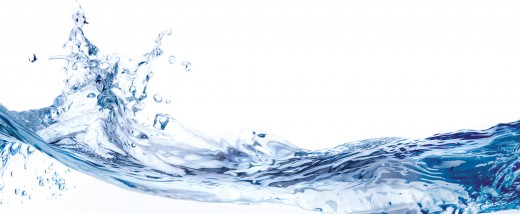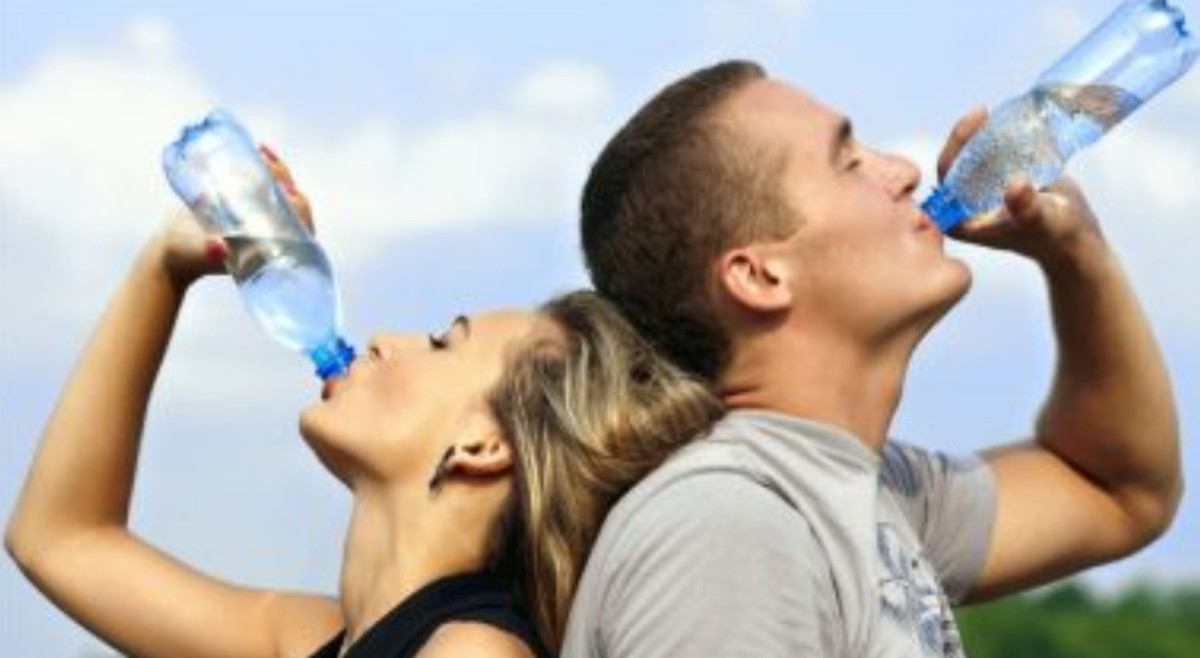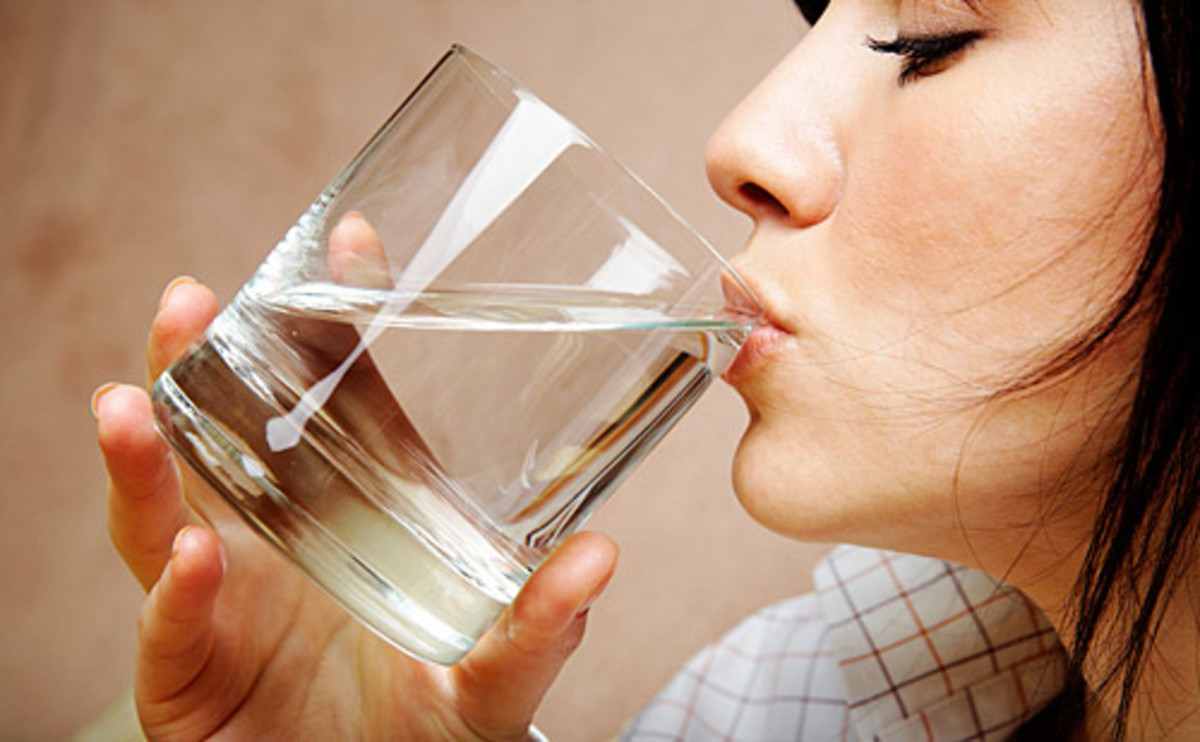27 Ways Water Helps the Body

We have learned the importance of water and how 6 to 8 glasses should be consumed each day for body health. But what are some of the ways water helps the body? Since the body is made up of 60-70% water it is important to take a look at this zero calorie beverage. It is also good to know that the body can survive a lot longer without food than it can without water. The benefits of water shown through studies greatly enhance the quality of life if this agent is taken seriously enough to consume the recommended daily requirement.
- Studies have shown that water may help aid in weight loss. Drinking water before a meal not only makes a person feel full, but also may boost the metabolism.
- Water helps the digestive system and aids in stopping constipation
- Studies have shown that regular water intake may reduce the chance of colon and bladder cancer
- Water helps the urinating process and therefore helps eliminate harmful carcinogens
- Water stops dehydration which may impact the mind
- For all you migraine headache sufferer’s studies have shown water brings relief from headaches. Also going without water for too long may even contribute to headaches
- Water helps with proper blood flow throughout the body
- Water helps aid blood pressure
- Water helps the kidneys keep up with removing waste from the body
- Water refreshes and energizes a tired body. Feeling tired is one sign of dehydration
- Water helps with brain function because dehydration causes brain tissue shrinkage
- Water helps keep the cartilage around the joints in the body hydrated
- Water helps to remain alert because dehydration is known to affect memory and focus
- Lack of water even causes death because the body can endure much longer without food than it can without water
- Water consumption may even affect the mood swings of a person. A grumpy attitude may only need water to refresh and perk up
- Hunger may only be a sign that a person is thirsty
- Water helps the skin
- Dark color urine is a sign of not enough water. Drink until color lightens
- Water helps prevent diseases because dehydration also contributes to toxic build up
- Water helps with sluggish and tiredness
- Water has zero calories so is better than other beverages that add calories
- Water also reduces cramps
- Water quenches thirst
- Water helps create saliva
- Water helps to regulate appetite
- Water helps to maintain healthy body weight
- Water helps regulate body temperature
our level of well being greatly depends on the fluids we consume through our bodies.
The old saying you are what you eat is only half of the story because a person is also what they drink. Sodas and other beverages with sugar harm the body over time and prohibits the body from functioning the way it was designed to do so.
More ways water helps the body
- Hydration: Water is essential for maintaining proper hydration levels in the body, which is crucial for overall health and well-being.
- Digestion: Water helps in the digestion of food by aiding in the breakdown of complex carbohydrates, proteins, and fats.
- Nutrient absorption: Water helps in the absorption of essential nutrients from food, allowing the body to utilize them effectively.
- Temperature regulation: Water helps regulate body temperature through sweating and evaporative cooling.
- Joint lubrication: Water helps lubricate joints, reducing friction and promoting smooth joint movement.
- Detoxification: Water aids in flushing out toxins and waste products from the body through urine and sweat.
- Weight management: Drinking water before meals can help reduce appetite and calorie intake, promoting weight management.
- Skin health: Proper hydration with water can help maintain healthy and radiant skin by keeping it moisturized and preventing dryness.
- Kidney function: Water is essential for optimal kidney function as it helps flush out waste products and prevent kidney stones.
- Muscle performance: Water is crucial for maintaining proper muscle function, including muscle contractions and endurance during physical activities.
- Brain function: Proper hydration with water is important for cognitive function, concentration, and mental clarity.
- Heart health: Drinking adequate water can help maintain proper blood volume and prevent dehydration-related stress on the heart.
- Oral health: Water helps in the production of saliva, which is important for oral health, including preventing dry mouth and bad breath.
- Eye health: Adequate hydration with water can help maintain healthy eyes and prevent dryness and discomfort.
- Bowel function: Water is essential for maintaining healthy bowel movements and preventing constipation.
- Energy production: Water is required for the production of cellular energy, allowing cells to function optimally.
- Immune function: Water helps in maintaining the proper functioning of the immune system, which is crucial for overall health and disease prevention.
- Mood regulation: Proper hydration with water can help regulate mood and prevent mood swings caused by dehydration.
- Liver function: Water is essential for liver function, including detoxification and metabolism of nutrients.
- Respiratory function: Water helps keep the respiratory tract moist, aiding in proper breathing and preventing respiratory discomfort.
- Reduces fatigue: Staying properly hydrated with water can help reduce fatigue and boost energy levels.
- Improves athletic performance: Water plays a crucial role in maintaining endurance, strength, and performance during physical activities.
- Prevents heat exhaustion: Drinking enough water can help prevent heat exhaustion and heat-related illnesses during hot weather or intense physical activity.
- Promotes healthy pregnancy: Adequate hydration with water is important during pregnancy to support fetal development, maintain amniotic fluid levels, and prevent constipation.
- Supports breastfeeding: Water is essential for breastfeeding mothers to maintain proper milk production and hydration levels.
- Prevents urinary tract infections: Drinking enough water can help flush out harmful bacteria from the urinary tract, reducing the risk of urinary tract infections.
- Reduces the risk of kidney stones: Staying properly hydrated with water can help prevent the formation of kidney stones by flushing out excess minerals from the kidneys.
- Enhances nutrient transport: Water helps transport essential nutrients, vitamins, and minerals to various cells and organs in the body.
- Supports cardiovascular health: Adequate hydration with water can help maintain proper blood viscosity and prevent blood clots, reducing the risk of cardiovascular diseases.
- Improves dental health: Water helps wash away food particles and neutralize acids in the mouth, preventing tooth decay and gum diseases.
- Supports brain development: Proper hydration during pregnancy and infancy is crucial for healthy brain development in newborns and young children.








